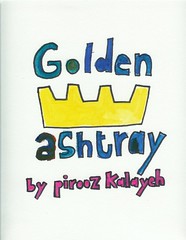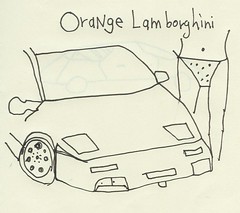Pirooz Kalayeh: No Tell is a hot little number. I love its gossip made secret. How did you come up with this model for a journal?
Reb Livingston: The new poem a day was a concept beaten into me during my employment at AOL during the mid-90's. People only came back to places where they could depend on new and dynamic content showing up. AOL had statistics up the wazoo proving that. This was important to the company because they wanted to sell advertising. It became important to me regarding No Tell Motel because I wanted regular readers. I liked how Dan Nester did Unpleasant Event Schedule by focusing on one poet at a time, so Molly Arden and I tweaked his idea and made it way cuter.
In terms of the theme (for lack of a better word), one time when I was 12 I bought a tee shirt for my little sister with a No Tell Motel neon sign and a woman saying "Sshhh." I didn't get it at the time, but I must have psychically drawn to the message, because I love the idea of being naughty without being crass.

PK: Do people ever object to the advertising (AOL) know-how you employ on No Tell? And, if so, how do you deal with this position of poetry as non-commodity?
Reb Livingston: I don't consider it so much "advertising" know-how -- even if that is where I first learned about content programming and audience development. I mean, NTM doesn't sell or have advertising anywhere on the site, we don't make a single penny. The difference is that AOL changed it's content strategy to maximize advertising sales, it made a lot more money from advertising than from membership fees so advertisers became their priority. That's why it sucked so bad. NTM's goal is to connect poems and poets with as many readers possible. NTM puts the emphasis on both the poems and the poet, puts the poems top level and easy to access. Every poet gets the same treatment and same chance to be read during her week, whether the reader recognizes her name or not. I wanted to utilize the benefits of the online medium, not try to cram in the strategies of print publishing. People don't read from the screen the same way they read paper. So yes, working at AOL for almost four years was definitely an educational experience that I'm still utilizing a decade later, but I don't think I'm employing the slick, empty and inane aspects of what happened with AOL's content programming during the mid-90's. In that respect I learned a lot about what not to do.
People object to all kinds of things, the cheekiness and pinkiness of the design, limiting the content to poems only and not employing reviews, criticism, or fiction. Some people don't like the variety of styles we publish. I'm not so concerned with what a handful of people object to -- Molly and I do what we like, enjoy ourselves and are proud of the work we publish.
PK: By adhering to your standards of multiplicity and inclusion, do you feel that NTM has the potential to broaden poetry’s scope?
Reb Livingston: Possibly. While we definitely aren't open to *anything* (we're two editors with our own limitation like anyone else) -- the range of styles, subjects and poets are broader than many poetry magazines, but because it's not packaged all together at once, readers don't get a disjointed mishmash. In a time when some are intent on categorizing and pigeonholing poetry and poets, NTM isn't avant-garde, experimental, traditional, formal, mainstream, or alternative - yet we publish poems and poets who are routinely placed in one or more of those categories. There's pressure to take a stand, pick some kind of arbitrary side, make alliances, if you don't, nobody knows what to do with you. "What are you?!?" they insist. We want to know all about you before we ever meet and we want to figure you out fast and without much effort. Write one pig-fucking poem and you're forever associated with the New Pig Fuckers. Then your dad googles you and wants to know why you're so intent on ruining the family name with your rampant pig fucking. It's viscous.
I think NTM goes against that grain. There isn't a typical NTM poet or poem; at least I don't think there is. Some people think we only want sex poems. I have nothing against sex poems and have published a number of them, but that's a small slice of what the magazine offers and sometimes when I'm cranky and reading submissions, I get easily annoyed. We do contribute to that misconception with the design and of course the Bedside Guide anthology. We expect people get our many aspects, but not everybody will -- and that's unfortunate, but life.
So yeah, the way NTM is set up, if a reader visits one week and doesn't like what's there, she knows next week is different poet with totally different poems and is likely to come back. Also, because of the focus on individual poems, a reader is more likely to read something they might skip over or flip past in another format. In that way, I believe the scope is broadened.
_______________________________________
"My Uncommon Concubine"
Words and Vocal by Reb Livingston
Music and Film by Mr. Pirooz
As we had some spare time in our busy schedules, we decided to cooperate on some music and an interview. The music turned into a music video. Reb managed to send me an audio file virtually, and then I got the music done after about 18 hours. It was a bit hard, but so worth it. The film was fun too.
_______________________________________
PK: Does inclusion and diversity factor into the stylistic range of your writing?
Reb Livingston: It does, but it's not especially intentional. Because I'm a touch magpie in my preferences, those influences bleed into my work -- although I'm not writing dramatically different work during any single stretch. My writing process is very intuitive, gives a middle finger to theory and fashion. I tend to write in phases, get on a kick that might last a couple weeks or a few years and mostly write work in a similar vein until it feels exhausted and it's time to move on to something different. It's not something I'm able to consciously control, I've tried breaking my flow with something very different, but if I'm not ready it doesn't happen, no matter how hard I force it. These days I fight a lot less with my process and work harder to go with it -- and find I'm much more productive that way. Mother knows best, as they say.
PK: Have you always felt the itch to raise your middle finger to theory and fashion? Did you ever feel differently?
Reb Livingston: No, especially not as a student. Theory was shoved down my throat as an undergrad and I tried really hard to see the point of it in poetry. Took me years to recover from the damage it caused my fragile little psyche. Fashion was more alluring, but in the end false and insincere. I remember during my mid-20's reading the "hot" new collections by younger authors, the ones being reviewed in big circulation magazine. I thought well, better start writing like that. I was easily influenced because back then my work didn't have any strong inclinations and not only did I not have a clue what I was doing, I hadn't a clue what I wanted to do. These days I have my own ideas and am secure enough that I'm only moderately perturbed when I read or hear a comment starting out with "like all good poets/poems/editors ________"
PK: What do you want to do now?
Reb Livingston: Right now I want to finish my taxes. Actually I don't really want to finish my taxes, I want them to be magically finished and I don't want to owe the government any money. I'd also like to take a nap, but that doesn't appear to be in the cards today.
I'd like to be able to garner up the momentum to be able to finish the projects I started. I'm cornered by loose ends. I tend to have an over-optimistic view of what I can accomplish within a tight timeframe. I'm learning, slowly.
I hope I can keep up the pace I've been maintaining on my current writing project.
PK: Jack Spicer often spoke about transmissions from Mars. He felt that the voices in his head - editors, friends, and audience - would fall away to Mars' static-free blips. Do you participate in a similar stripping of thought when you work? Do you even think at all?
Reb Livingston: I have trouble meditating, I don't get transmissions from other planets -- or if I do, I can't hear them over the squirrels spinning in their wheels. They're very loud and they rarely take breaks. My mind is very busy, fractured, all over the place, a real mess. It's not the voices of friends, family and audience in my head -- it's my own voices, and I don't know all of them, and I'm often meeting new ones, sometimes scary ones, sometimes I spend years trying to avoid them. Sometimes they slip into my poems and freak me out. Sometimes I find out they're not so scary after all. Sometimes I discover they're a lot worse than I imagined and they get me into trouble.
So I guess what I'm saying is that somebody is thinking and that somebody in the end is me, but it's often not a part of myself I'm on regular speaking terms with, or if I am, I'm reluctant to admit it.
PK: How much of your poetry is part of getting on speaking terms with the voices you may be reluctant to converse with? Is this the secret to NTM as well?
Reb Livingston: Hah, well, recently I was psycho-analyzed by two dear poet friends who suggested that I started No Tell Motel during a period in my life when I wanted to acknowledge the existence of secrets in some way, not spill them mind you, let them out of attic, store them in a bedside drawer. I was kind of floored by their reading, but maybe they weren't too far off. For years I made the point not to write about anything that made me squeamish. What resulted was a slew of anxiety-ridden, ugly squeamarrific poems. These days I'm more open to those voices, let them jabber -- I can always edit them out afterward, although I'm finding once they make it on the page they often stay there.
PK: At the day's end, would you say you have reconciled with the jabber? Is it simply walks on the beach with a walrus after that? Or, do you hire the walrus to do your taxes?
Reb Livingston: There's no reconcile with the jabber! Never. If I'm lucky it'll be a perpetual skirmish. But the jabber seems sincere, however off kilter, fucked up and menacing. I left the walrus behind and I hope the waves washed away my footprints. Oyster suck, soul suck, charm aside, the walrus is the bad energy masquerading as friend not to be trusted to do anyone's taxes.
 Reb Livingston is the author of Your Ten Favorite Words (Coconut Books, Fall 2007), Pterodactyls Soar Again (Whole Coconut Chapbook Series, 2006) and co-author of Wanton Textiles (No Tell Books 2006). Her work has appeared in Best American Poetry 2006 (Scribner). She's also the editor of No Tell Motel and publisher of No Tell Books. With Carly Sachs she co-curates the Burlesque Poetry Hour.
Reb Livingston is the author of Your Ten Favorite Words (Coconut Books, Fall 2007), Pterodactyls Soar Again (Whole Coconut Chapbook Series, 2006) and co-author of Wanton Textiles (No Tell Books 2006). Her work has appeared in Best American Poetry 2006 (Scribner). She's also the editor of No Tell Motel and publisher of No Tell Books. With Carly Sachs she co-curates the Burlesque Poetry Hour.












2 comments:
are you censoring yourself?
last time i checked there was part one of a short story here... or was it a true story? i liked it, whatever it was.
this is very curious though. you've never been the type to stifle your creative expression.
hope you're well.
much love,
b
I like to post beginnings of things. Sometimes they stay. Sometimes they don't. I just like to look at them out on a website to see how they hold up. If they keep me interested the next day, I'll keep them. If not, I let them go.
Right now I am playing with a new style of writing. I haven't quite figured out what I want to do. I'm just playing with different themes and ideas. As I grow clearer about what I'm doing, I'll be sure to share it with my homeboys and girls. Especially with a mackdaddy such as yourself.
Post a Comment